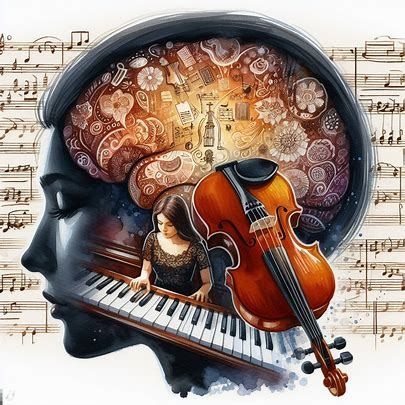
🎶 Introduction
From the gentle hum of a lullaby to the electrifying pulse of a live concert, music and songs are an inseparable part of human life. Across cultures and continents, music transcends language, age, and background. It has the power to heal, inspire, unite, and even educate.
In this article, we explore how music and songs influence human emotions, mental health, culture, and society. We also look at their role in digital entertainment and why they remain one of the top forms of global entertainment today.
🧠 Music and the Human Brain
Studies show music stimulates multiple regions of the brain, boosting memory and emotion
🔗 Image Source: Wikimedia Commons
✅ Music Stimulates the Brain
When you listen to music, your brain releases dopamine, the “feel-good” neurotransmitter, similar to what happens when you eat chocolate or fall in love. It affects:
-
🧠 Memory and recall
-
😄 Mood and emotion regulation
-
💤 Sleep patterns
-
🎯 Focus and concentration
Studies even show that learning music from a young age improves IQ, math skills, and verbal memory.
🧘♀️ Therapeutic Use of Music
Music therapy is a proven method used for patients suffering from:
-
Depression
-
PTSD
-
Autism
-
Alzheimer's disease
-
Chronic pain
It helps people reconnect with emotions, reduce anxiety, and enhance social interaction.
🌍 Music as a Cultural Bridge
Every culture has its unique sound and rhythm – yet music connects us all
🔗 Image Source: Wikimedia Commons
Music is not just entertainment; it’s a reflection of culture and identity.
🌐 Key Cultural Roles:
-
📜 Storytelling: Folk songs preserve traditions and historical narratives.
-
🧑🤝🧑 Unity: National anthems, protest songs, and spiritual chants bring people together.
-
🪘 Rituals: Music is used in weddings, funerals, and religious ceremonies across the globe.
From African drums to Indian sitars, Celtic violins to Latin guitars—each culture uses music to express beliefs, struggles, and joy.
🎤 Evolution of Songs Through Time
📻 From Oral Traditions to Streaming
| 🕰️ Era | 🎵 Format | 📱 Platform |
|---|---|---|
| Ancient | Oral songs, chants | Word of mouth |
| 1800s | Sheet music | Parlors, churches |
| 1900s | Vinyl records, cassettes | Radios, Walkmans |
| 2000s | MP3, CDs | iPods, computers |
| Today | Digital Streaming | Spotify, YouTube, Apple Music |
Modern technology has transformed how we create, share, and consume music, making it more accessible than ever before.
💡 Genres of Music: Something for Everyone
The diversity of music genres reflects the diversity of human emotions and experiences
🔗 Image Source: Wikimedia Commons
There are hundreds of music genres worldwide. Some popular ones include:
-
🎸 Rock – Energetic, rebellious, electric
-
🎹 Classical – Complex, calming, intellectual
-
🎧 Electronic (EDM) – Pulsing, modern, rhythmic
-
🎷 Jazz – Improvisational, soulful
-
🎤 Pop – Catchy, mainstream, emotional
-
🕺 Hip-hop/Rap – Rhythmic storytelling, urban culture
-
🪕 Folk/Traditional – Cultural, historical, acoustic
Each genre appeals to a different emotional or social experience, making music highly personal and universal at once.
📈 Music in the Digital Age
📲 Rise of Streaming Services
Thanks to platforms like Spotify, YouTube, Apple Music, and SoundCloud, anyone can access millions of songs with a tap.
Benefits of digital music:
-
🔄 Instant access across devices
-
🎶 Personalized playlists and AI-based recommendations
-
🌍 Global exposure for new artists
-
📢 Viral trends (e.g., TikTok music challenges)
🧑🎤 Independent Artists and Democratization
With low-cost recording tools and online platforms, independent artists now compete alongside mainstream stars. Music is no longer controlled by big record labels—everyone has a voice.
❤️ Emotional and Social Impact of Songs
🥹 Songs That Heal
-
💔 A breakup song can help you grieve
-
🥳 A dance hit can lift your mood instantly
-
🕯️ A spiritual hymn can offer comfort during loss
Songs mirror our emotions, offering solace and celebration alike.
👥 Music as a Social Connector
Whether at a wedding, a football match, or a concert, music brings people together. Shared musical experiences:
-
Strengthen relationships
-
Foster community and belonging
-
Bridge cultural or language gaps
🧭 Educational & Developmental Benefits
Music plays a key role in early childhood development and lifelong learning.
-
🎼 Improves language and reading skills
-
🧠 Boosts memory and attention span
-
🤝 Encourages teamwork through group performances
-
🧘 Teaches discipline and emotional regulation
This is why music is often included in school curricula worldwide.
🌟 Conclusion: Music Is Life
From ancient chants to AI-generated beats, music and songs have remained a core part of human experience. They teach, heal, inspire, and unite us. No matter your language, culture, or background—there’s a song that speaks your soul’s language.
In an age of stress and speed, music offers a moment of connection, joy, and stillness.
So, plug in your headphones, turn up the volume, and let the music carry you.
🔍 SEO Keywords (Used & Optimized)
-
Music and songs
-
Importance of music in life
-
Music and mental health
-
Benefits of listening to music
-
Types of music genres
-
Music in digital age
-
Emotional impact of songs
-
Music for brain development
-
Music therapy
-
Popular music platforms

You must be logged in to post a comment.